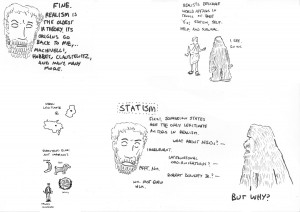
There are three main paradigms of international relations theory: realism, liberalism, and constructivism. Realism states that all states are driven to act in their own best interests in unchangeable world of anarchy, requiring a large military at times to maintain security (Bova 8-19). Liberalism states that global cooperation and movement past realism is possible through three main ways- international institutions, commerce between states, and the spread of republics less likely to sway towards war (Bova 19-22). Constructivism states that although states tend towards power-seeking opportunities, the anarchy of international relations does not necessitate such behaviors and furthermore, new norms and non-state actors such as transnational organizations and individuals also play a part in whether states follow a realist path of action or not (Bova 24-26). These paradigms are used to understand behaviors and interactions between actors in the international arena. Thus members of each paradigm have a different take on how global politics will play out in regards to global climate change. Dr. Russell Bova, in his textbook “How the World Works,” writes “in short, for realists, the expectation that global environmental crisis will lead to cooperative responses is both naïve and contrary to the record of human history” (249-50).
Efforts thus far in governing global climate change include, among other things, forming the UNFCCC and the Kyoto Protocol, and hopefully soon, a new mitigation agreement to replace the Kyoto Protocol in COP21 in Paris in 2015. However, these are not the only methods by which states and other parties in the world address climate change. Other efforts include private encouragement of sustainable, renewable energy development (Held, Roger, Nag 19), sub-national government efforts like carbon trading within individual U.S. states, and NAMAs, or National Appropriate Mitigation Action. Evidence from efforts to govern global climate change do not support this realist view, and in fact, none of the above paradigms perfectly explain the global climate change international responses and governance. Nevertheless, liberalism best describes the recent history in global climate change governance while constructivism describes the near future of global climate change governance.
Nation-states and interstate governance is only one facet of addressing global climate change. Any paradigm focusing on states as the main/only actor in international relations ignores some of the most important actors global climate change governance. Thus, realism which argues nation-states are the only actors in the international relations arena fail to acknowledge key actors in global climate change governance and thus do not explain current trends in global governance. Liberalism proves more hopeful in terms of its acknowledgement of non-state actors, as exemplified by institutional liberalism. Institutional liberalism looks to the formation of formal international governance bodies and laws to turn the world away from a realist fate. Such institutions include the UNFCCC and Kyoto Protocol. However, as Bulkeley and Newell point out in their introduction, the multi-scale, multi-actor nature of global climate change problems requires a “shift away from the position that the nation-state is the only or necessarily most important unit of climate politics” (4). Thus the institutions that liberalists propose still do not align with newer attempts to govern global climate change including non-state actors. Looking backwards, liberal institutionalism explains the Kyoto protocol and UNFCCC but fails to explain what the future might hold if politics are to go down the path Bulkeley and Newell suggest.
Lastly, constructivism may be the most promising paradigm to explain current attempts at global climate change governance as it touches on the need for inclusion of non-state and transnational actors as they promote ideas which promote moving away from realist state behavior. The key to constructivism is that it does not require a structural change such as international law to govern a state’s behavior away from realist tendencies (Bova 27). Therefore, it offers a third option to addressing climate change on a global level besides institutionalism (liberalism) and war (realism). Because constructivism does not require a state-centered governance structure, it falls along the line of Bulkeley and Newell’s thinking that future politics will move past state-centered governance structure as more and more types of actors hold important parts in mitigation and adaptation efforts.
Realism developed to explain countries’ actions in post WWII and Cold War politics (Bova 8) and has lost its relevance as issues like climate change require a cooperative multi-level, multi actors approach to solve the problem. Consequently, the newest paradigm of constructivism, best explains why global governance regarding climate change is going towards a less state-centric approach. Wide-scoped problems call for wide-scoped responses as is reflected in a turn to the constructivist approach to global governance problems.
Works Cited
Bova, Russell. How the World Works. Longman Publishing, 2011. Print.
Bulkeley, Harriet, and Peter Newell. Governing Climate Change. New York: Routledge, 2010. Print.
Held, David, Charles Roger, and Eva-Maria Nag, eds. “Editors’ Introduction: Climate Governance in the Developing World.” Climate Governance in the Developing World. Malden: Polity Press, 2013. 1-25. Print.
